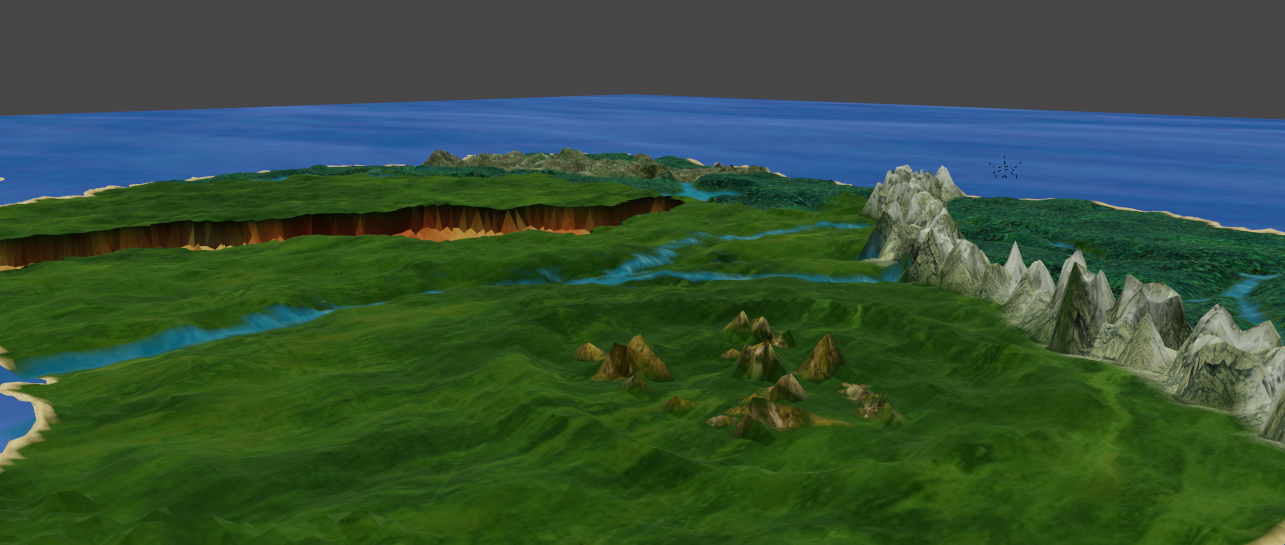Fugue Devlog 12: The World, the Story, and the Game Mechanics
The last week has mostly been a lot of waffling about game mechanics. Should characters have skills/attributes? Should there be any combat, and if so, what should it be like? Are there any “skill games” (like the hacking mini-games that are so prevalent in games)? I originally threw around the idea of there being these kinds of mini-games for different character skills, like repairing machinery or cooking food.
I’m leaning towards just sticking to the dialogue system as the main “mechanic” and seeing how far I can stretch that. If there’s any combat, it could be interesting to use the dialogue system for that–in games like Final Fantasy 7, combat is basically through a set of menus, which isn’t all that different than the dialogue system I’ve set up. Or combat happening through dialogue choices as skill checks, like in Disco Elysium (h/t Matt). This is just an example–in practice, there will be very little combat if any in the game. Other skill games/mini-games could take place through the dialogue system too. I like this approach because it gives me a constraint (and so makes the task of coming up with mechanics a bit less daunting) and also lets me hone the dialogue system further.
I’m not totally confident in that decision; I have a weird premature regret about not including other mechanics because I’m worried the play experience will feel lacking. At the same time, I know that plenty of games that are basically just dialogue are really, really good. There are a couple of systems, like law and organizational resource management, I want to include in the game, but these don’t necessarily translate into new mechanics (i.e. they can probably be expressed through the dialogue system). I think I just have to stick with this decision for now and be open-minded about something changing later.
One reason I’m hesitant about introducing more mechanics is that the branching narrative will already introduce a lot of complexity, requiring a lot more dialogue and scenes and what not for each branching path. It might be too much as-is: I’ve also spent some time trying to think through the world and narrative to have a better feel for how much branching and different scenes there’ll be, and it’s shaping up to be a lot.
I also started laying out the geography of the world. The various regions are developed according to a few priorities: the aesthetic priority/what feeling that landscape evokes; its implications on the geopolitics and history of the world; how geologically feasible they are. For the latter point everything is inspired by real formations/environments, but the spatial arrangement needs to be feasible, like where should the mountain ranges be? What biomes should be near them?
To help answer these questions I read a bit about how mountains, rivers, and so on work. There were several helpful guides on mountain formation, rivers and watersheds, general advice on the map design and vegetation. This channel has several videos on not only these topics but also on mineral deposits, wind, and more.
This procedural map generator also helped give some base material to shape.
I figure once I have a map it will make sorting out additional details a bit easier. I can ask it questions or think through how the existing factions and cities would maneuver through the world instead of coming up with ideas out of thin air and then trying to make them all fit together. For example: placing one city (Baita City) on a major river that empties out into a bay (Bao Bay) which is the location of another major city. If trade occurs mostly along the coast of the land, then Bao Bay can unilaterally blockade Baita City, so Baita City might want to develop a land route to the other major city. But perhaps the only viable path is expensive or dangerous to develop so Baita City can’t do so until some new technology makes it feasible. But once that happens it dramatically shifts the relationship between Baita City and Bao Bay. Similarly, the character and culture of a settlement is going to be influenced by its geography so this also helps me have a stronger idea of what the cities look and feel like.
Here’s what I have so far:

I need to work out the two smaller islands, fill in more details of the mainland, and add in settlements. I had a pretty good workflow going using Blender’s vertex coloring to paint on different terrain textures, but for some reason the vertex color limit is set to 8 (really annoying), so I have to figure out a different approach now.
This part of the process is such an emotional roller coaster, at times overwhelming from the possibilities/uncertainty, daunting from all the work different decisions imply, frightening because of all the ways things could go wrong, anxiety-inducing from the possibility of foreclosing certain mechanics or world/narrative features by committing to choices, or satisfying when pieces start to click together. In any case, it’s not something that I can rush. The world’s regions, factions, and narrative arc are coming together…but very slowly.
